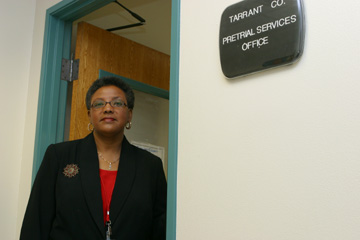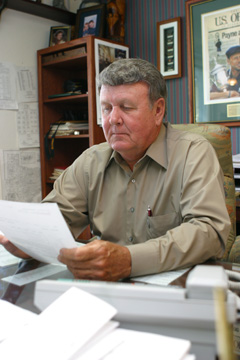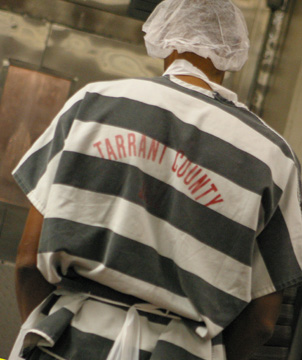 Same for District Clerk Tom Wilder — $10,000 out of about $190,000 raised is more than a drop in the bucket, though not exactly a gusher either.
Same for District Clerk Tom Wilder — $10,000 out of about $190,000 raised is more than a drop in the bucket, though not exactly a gusher either.
But look at it from the other side of the fence. Public records show that Tarrant County’s powerful bail bond lobby gave those amounts to Johnson and Wilder in the same time period during which they contributed a whopping total of only $1,100 combined to three other commissioners and County Judge Tom Vandergriff. If they’re going for power in the criminal justice system, maybe they unloaded some loot on District Attorney Tom Curry? Well, not much — only $1,050 since 2003.
Why the preference for Johnson and Wilder? It’s not so hard to figure out: Wilder’s major job is to work with the Tarrant County criminal courts, the places where the bond agents do their business. And Johnson serves as chairman of the Tarrant County Bail Bond Board, which handles the licensing of agents, revoking licenses when bond forfeitures aren’t paid, and interpreting policies that have major impacts on the local bail bond industry.
Bail bond agents and their reps aren’t shy about explaining it either. “Everything is political in this town, and you have to have some people on your side to make that work,” said bond agent David Gallagher. “There is nothing wrong with us contributing to political campaigns of politicians who have worked to make our criminal justice system work better. Attorneys make even more campaign donations, but nobody ever raises that issue. All we are trying to do is keep a system that has worked well for years, keeping people who don’t deserve it [from getting] the free bonds and free lawyers that the county has to pay for.”
What Gallagher is talking about is a county program called PreTrial Services that provides bonds for as little as $20 for most low-risk defendants accused of nonviolent crimes. The program is used extensively in other big-city Texas counties, but in Tarrant it’s been pretty much shunted to the side. The bond agents want to keep it that way, but pressure is increasing from judges and others to expand the program. And they’re looking to Johnson and Wilder in particular as their allies, on this and other developments they believe are putting the screws to their profits — developments that others see as potentially saving taxpayers money and providing a more efficient, equitable system of criminal justice.
For instance, there’s the movement among local criminal court judges to fund a full-time central magistrate who would have the power to lower bonds that many defense lawyers and judges say are routinely set too high by municipal judges. And then there’s the question of bond forfeitures. The county often collects only a fraction of the actual amounts owed when an accused person fails to show up for trial and bonds are forfeited. The discounts are worth millions of dollars each year to the local bond industry — and to taxpayers.
Both sides talk about the need to “balance the interests” of the bail bond industry (who want high bonds, limited access to attorneys, and few options for prisoners) and defense lawyers (who want low bonds and quick attorney access).
 But the bail bond industry seems to be doing fine in Tarrant County, which has more bond agents than any Texas county except Harris and a higher percentage of defendants in jail before trial than most big-city counties. The “balancing” scenario also doesn’t take into account the costs to taxpayers — millions in jail costs for keeping nonviolent, low-risk inmates in jail longer, and higher than normal costs for county-paid attorneys for poor defendants. Nor does it take into account the cost to nonviolent defendants who, in Tarrant County, often spend weeks or months in jail for minor offenses because, up until now, they haven’t even had access to information about the county pre-trial release program or county-paid legal help.
But the bail bond industry seems to be doing fine in Tarrant County, which has more bond agents than any Texas county except Harris and a higher percentage of defendants in jail before trial than most big-city counties. The “balancing” scenario also doesn’t take into account the costs to taxpayers — millions in jail costs for keeping nonviolent, low-risk inmates in jail longer, and higher than normal costs for county-paid attorneys for poor defendants. Nor does it take into account the cost to nonviolent defendants who, in Tarrant County, often spend weeks or months in jail for minor offenses because, up until now, they haven’t even had access to information about the county pre-trial release program or county-paid legal help.
The campaign contributions to supporters like Johnson and Wilder are “what we have to do,” said Ronnie Long, who has one of the largest bond businesses in the county. “Our bond business is very high risk, and the pre-trial program is not geared toward those who cannot afford private bonds, but to criminals who have money and the right contacts. What they are doing is taking away a part of our business that balances off the other high risk bonds we do. We don’t have any cushion any more.”
There is such a fight over the business that the Tarrant County Bail Bondsmen Association has hired former Texas House Speaker and current influential lobbyist Gib Lewis to work on their behalf. Lewis would not comment on his work for the group, and members of the association wouldn’t disclose what Lewis is being paid.
J.D. Johnson did not return calls for this story, but Wilder said his support of private bond agents and his reservations about the pre-trial release program aren’t connected to the political support.
“I’ve always said, even before I was an elected official, that government should not be in competition with private industry,” Wilder said. “I believe in free enterprise, and the bail bond agents should be a big factor of the marketplace. The [PreTrial Services Program] is lax in my opinion on the financial requirements. We should be able to look at the financial picture of the accused. We have a lot of crime, and the marketplace is what keeps [bond agents] going. The expense of bonding the accused out of jail is borne better by private industry than the taxpayer.”
As for the amount of money he gets from bond agents in campaign contributions, Wilder said, “the bulk of my campaign money comes from attorneys. I don’t think [bond agent contributions]are as high as five percent [of his total], but if those are what the reports you have, then fine. But it sure ain’t going to buy anything from me.”
 The PreTrial Services Program began statewide in 1979, with the intent of getting nonviolent and low-income prisoners out of jail pending trial. But several court rulings held that access to the program could not be based on income and that it had to be opened up to all defendants who qualified based upon the level of their crimes. The state’s vague rules give counties plenty of latitude to shape the program as they see fit. For instance, most counties allow accused criminals with a previous misdemeanor conviction to qualify, while Tarrant County does not. And many other counties also allow defendants who live outside the county to benefit from pre-trial release — but Tarrant doesn’t.
The PreTrial Services Program began statewide in 1979, with the intent of getting nonviolent and low-income prisoners out of jail pending trial. But several court rulings held that access to the program could not be based on income and that it had to be opened up to all defendants who qualified based upon the level of their crimes. The state’s vague rules give counties plenty of latitude to shape the program as they see fit. For instance, most counties allow accused criminals with a previous misdemeanor conviction to qualify, while Tarrant County does not. And many other counties also allow defendants who live outside the county to benefit from pre-trial release — but Tarrant doesn’t.
For its first 13 years, the local program was run by the local judges. But in 1992, the commissioners court took it over, and since then the number of inmates using the cheaper public bonds has remained below the state average.
More than anything else, Tarrant County has fought hard to keep information about the PreTrial Services Program away from the inmates. Every county that has the program — including Travis, Harris, and Dallas — has signs in holding cells and other detention facilities listing contact information for it. In Tarrant, where private bail bond companies have always had their signs throughout the jails, county officials made the rather odd argument that they shouldn’t advertise their own services within their own jails.
Local judges forced the county to seek an opinion from Texas Attorney General Greg Abbott about the lack of signs. Last January, Abbott ruled that the county was not only allowed to put up the signs, but that it was violating state law if it didn’t.
That wasn’t the end of it. A task as simple as posting a sign that says “You may be eligible to be released on personal bond” and gives a phone number has taken six months. Wilder said it was just the length of time it took to determine proper language and to design signs that would work in the jail without danger to inmates or guards. The signs start going up this week and should be in all jails in Tarrant County within a few months.
County Criminal Court Judge Daryl Coffey said the whole request for the AG’s opinion and the delay in posting the signs was “just a stall tactic to protect the business of the private bail bond agents.”
 In the bail bond argument, both sides continually claim that their philosophy saves money and protects taxpayers — and the county doesn’t always help get to the bottom of that debate. Wilder, for instance, said that the county currently doesn’t have the computer capacity to determine what percentage of the bonds in the approximately 16,000 criminal cases filed here annually are done by private bond agents, the PreTrial Release Program or personal recognizance on a judge’s say-so. The district clerk said that a new computer system should provide that capability by next year.
In the bail bond argument, both sides continually claim that their philosophy saves money and protects taxpayers — and the county doesn’t always help get to the bottom of that debate. Wilder, for instance, said that the county currently doesn’t have the computer capacity to determine what percentage of the bonds in the approximately 16,000 criminal cases filed here annually are done by private bond agents, the PreTrial Release Program or personal recognizance on a judge’s say-so. The district clerk said that a new computer system should provide that capability by next year.
Still, Coffey, a proponent of pre-trial release, said there are some numbers that show how Tarrant County bond agents exert their political influence.
In looking at misdemeanor cases handled by his court thus far this year, Coffey determined that about 70 percent of defendants used private bonding agents, while about 10 percent used the Pretrial Services Program. The bonds set for the two groups were similar: Private bonds averaged about $1,000 per case, while the Pretrial Services’ were about $800.
The big difference showed up in how much it cost the defendants to get those bonds. Pretrial Services inmates paid 3 percent of the bond amount, or an average of $20. Those with private surety bonds paid 15 to 20 percent, or $150 to $200. “What ends up happening is that these accused [who get private bonds] spend too much time in jail trying to get money and then show up in court and say they can’t afford counsel,” Coffey said. “The show-up rate is the same whether it is private or Pretrial Services bonds. What happens is that our system puts money in the bond agents’ pockets, then the taxpayer pays for indigent defense. In so many cases, we could have that reversed.”
By comparison, Travis County, with about 15,000 criminal cases filed per year, uses the Pretrial Services Program for about 80 percent of its misdemeanor cases and about 20 percent of felony cases. Tarrant County doesn’t officially keep those numbers, but Tarrant County PreTrial Services director Michelle Brown said the agency handles about 250 cases per month, or only about 20 percent of the county’s caseload.
The difference is funding and, of course, the signs. Travis County’s PreTrial Services Program has 50 employees and an annual budget of $2.6 million per year. The Tarrant program has an annual $1 million budget and 16 employees. Brown expects the number of criminal clients to go up here once the signs are in place. “We don’t know what the impact might be, but I would expect we might not have the staff or the budget to handle it all,” Brown said.
Would an increase in budget for the Tarrant County PreTrial Services Program cost taxpayers money or save money? More than likely, it might save the county. Last week, Tarrant County jails held 1,951 unsentenced felony inmates, and 264 unsentenced misdemeanor inmates. If, as in Austin, about 80 percent of misdemeanor and 20 percent of felony defendants used PreTrial Services, that could mean 390 felony inmates and 210 misdemeanor inmates might be out of jail. At $50 dollars a day to pay for incarceration, that could work out to a savings of $30,000 per day or about $11 million a year.
Even if the county still limited the program to the misdemeanor jail population, the savings could be substantial. Using the 80 percent formula again, the savings would be $3.8 million.
Don’t expect the PreTrial Services budget to increase, however. In response to a study done by the National Center for State Courts in 2005, Wilder wrote, “I have great difficulty in believing that pre-trial release should be the first option given its cost to the taxpayer. Information … indicates that a pre-trial release costs the taxpayer over $300 on average, where surety bond costs the taxpayer nothing. … At $300 average per pre-trial bond versus $30 a day to house defendants in jail, the taxpayer might prefer to risk a few days’ jail cost until relatives or friends raise the money to bail a defendant out.”
 Think of the bond business like a bookie’s trade. The agents don’t care much whether you’re innocent or guilty — they’re just betting that, in enough cases to keep them profitable, the defendants who come to them for bonds will actually show up in court.
Think of the bond business like a bookie’s trade. The agents don’t care much whether you’re innocent or guilty — they’re just betting that, in enough cases to keep them profitable, the defendants who come to them for bonds will actually show up in court.
If a bond is set at $2,000, a defendant who goes to a private bond agent will pay $300 to $400 — nonrefundable, even if the defendant shows up in court as promised. But if the defendant doesn’t show up, the bond agent — at least theoretically — owes the county the whole $2,000.
Like the bookies who lay off bets to their colleagues, however, bond agents, at least in Tarrant County, have a built-in safety valve to lessen their financial pain when their clients don’t show up for trial.
Local rules allow the bond agents, in most cases, to pay only a fraction of the total forfeit amount through negotiations with a judge or the district attorney’s office. The county seeks its money in bond forfeitures through civil lawsuits, in which any settlement is allowed if the two sides agree.
As a result, the amount of bond forfeiture money collected versus what is owed is striking. In May 2006 alone, bonds worth $563,580 were forfeited in Tarrant County because of criminal defendant no-shows — but only $60,198 of that was collected. From January to May of this year, $3.4 million in bonds was forfeited, but only $545,000 was collected.
“Taxpayers are getting ripped off with this, and much of it is because the bond agents have so much political power in Tarrant County,” said District Judge Sharen Wilson. “The bonding agents are very powerful in terms of political influence. We’ve seen it with their ability to get legislation passed, and we see it with the preservation of this percentage they pay. They have influence with elected officials and they use it.”
In fact, Tarrant County’s forfeiture schedule is tilted toward bond agents. In misdemeanor cases, if a defendant fails to appear, the bond agents can pay just 30 percent of the bond plus court costs if they do so within 30 days. The percentage increases each month after that, but the county goes after 100 percent of the bond only after 180 days. Felony cases start the same way with 30 percent within 30 days, but the county won’t go after 100 percent of the bond until the money has been owed for nine months.
 Wilder said the system — last changed in 2003 — is in place for a number of reasons. Bond agents can get some of their money back if they find the absent defendants. “The courts want the body, not the money, and by giving them time to pay up, it allows them the resources to go find the accused,” Wilder said. The district clerk said he didn’t know how the current percentage schedule was arrived at, “but that is the way things have been done here for a long time.”
Wilder said the system — last changed in 2003 — is in place for a number of reasons. Bond agents can get some of their money back if they find the absent defendants. “The courts want the body, not the money, and by giving them time to pay up, it allows them the resources to go find the accused,” Wilder said. The district clerk said he didn’t know how the current percentage schedule was arrived at, “but that is the way things have been done here for a long time.”
Don’t talk to bond agent David Gallagher about how he and his colleagues are getting off cheap on forfeitures, however. “The issue is not about the particulars of our business,” he said. “The issues are about how the taxpayers are being cheated by letting people out of jail for nothing and then paying for their lawyers.”
Who pays the legal costs for the poor wouldn’t seem to be part of the bonding business, but it has become part of the debate in Tarrant County. Why? Because the earlier that the county offers lawyers to poor defendants, the quicker those defendants find out about PreTrial Services, and about a central magistrate who might be able to reduce the bond amount.
The state’s Fair Defense Act (Senate Bill 7), passed in 2001, set off a whole series of changes in Texas’ criminal justice system. Unhappy with problems in Harris County and the Rio Grande Valley — where many poor inmates were staying in jail for long periods of time without defense lawyers being appointed — the Texas Legislature passed a sweeping set of reforms to speed up that process. The result was that counties had to provide screeners to find who, among its criminal defendants, qualified for publicly paid lawyers.
When the law went into effect in January 2002, many counties bit the bullet and hired magistrates as full-time screeners. Tarrant County hired a part-time magistrate and screeners, but allowed municipal courts to do their own screening. “Most of these judges were handling traffic tickets for the most part, but now they were determining if someone on a DUI charge was indigent. The job was thrust upon them,” said former prosecutor Don Hase.
The judges think the system isn’t working well, and they are pressuring commissioners to make the central magistrate job a full-time post and allow the magistrate to handle much more of the screening for indigent defense work. The judges want Magistrate Matt King’s role to be expanded so that he not only decides whether defendants qualify for appointed lawyers, but also determines if bonds have been set too high. “The way it works now,” Judge Coffey said, “it could be days or weeks or a month before the case comes before me and I can reduce the bail amount. Usually by that time, the bail has been posted,” he said, meaning that what money the defendant has scraped together has already gone for the bond, and the county is left to pay the person’s legal fees. “That is costly to the taxpayer and not very fair to the accused,” Coffey said.
Arlington Municipal Judge Stewart Milner bristles at the suggestion that bonds set by him and other Arlington municipal judges are too high, as many defense lawyers suggest privately. He said the current system works well because local judges know the cases and the community.
“We have a suggested schedule provided to us by Tarrant County, and we try to keep the bonds set within those elements,” Milner said. “But we also look at the community standards in Arlington, the level of violence in each case, and we have a good idea on what constitutes a fair bond.
“But if the county wants to change the state law, we will go along with whatever that is,” he said.
There are many arguments on whether higher bonds affect indigent defense costs. A study of Tarrant County’s indigent defense system released in March by the Texas Task Force on Indigent Defense — a state government body — found that 48 percent of the county’s criminal cases required a publicly paid lawyer in 2005. The statewide average was 41 percent, and Tarrant ranked only behind Dallas and Harris counties. Across Texas, the average cost per criminal case was $342, compared to $381 in Tarrant. In all, the county spent $9.6 million in indigent defense last year.
Differing unemployment rates and income levels in various counties can skew the costs of their indigent defense programs. But in Tarrant County, the main argument is whether higher private bond costs feed the need for those publicly paid lawyers by eating up poor people’s available cash.
Wesley Shackelford, special counsel for the task force and author of the study, said the correlation between the use of private bonds and indigent defense needs was not studied specifically for Tarrant County. “When someone has to pull together what resources they have to pay the bail, they may or may not have sufficient resources left to pay counsel,” Shackelford said. “Someone else might be paying your bail. But on a case-by-case basis, we often do see instances of the accused paying high private bonds and then needing indigent counsel.”
The central magistrate system, by appointing lawyers sooner and allowing the magistrate to reduce bonds, could lower the number of defendants who get their legal costs paid by taxpayers.
“Sometimes we are putting the cart before the horse here,” Coffey said. “We are trying to find better ways to provide indigent defense, but we are not looking at the effect the bail business has on all of this. The reliance on private bail bond agents for the majority of cases definitely affects the cost the taxpayers pay in indigent defense.”
Don Hase, the Arlington defense lawyer and former prosecutor, said quick screening of bond amounts and indigent qualifications make sense for the criminal justice system and taxpayers. “Clearly the bail bondsmen are politically powerful here, and politically there is influence to keep pre-trial release [numbers] as low as possible,” Hase said. “We can see the results. If Tarrant County would allow more pre-trial releases, it would get them out of jail quicker and would allow them to hire a lawyer. Along the way we can do proper screening of those who are truly indigent.
“There must be a balance, but right now there is not much balance at all,” he said. “The goal of the county should not be that bail bondsmen stay in business.” Still, he said, Tarrant County “seems to be making strides” toward making bonds more uniform and centralizing criminal justice decisions.
Bond agent Ronnie Long said the number-one issue for bondmen across the state “is we need to get SB7 changed. No free lawyers and no free bonds. Law-abiding citizens don’t want that.” The argument holds great sway with citizens who want to put the bad guys away for a long time, but it runs up against the basic constitutional rights of accused persons to be considered innocent until proven guilty — and their right to legal counsel.
One longtime local bond agent who asked that his name not be used explained his industry’s fear: More screeners for poor defendants means more access for defendants to the county’s cheap PreTrial Services Program — and also a reduction in the power of municipal judges, with whom bail bond agents feel they have more clout. “We need to cut the head off this chicken,” he said. “Our court system isn’t broke, but they keep wanting to let people out for free as a way to fix it. That’s just stupid.”
Joe Johnson Jr.’s appointment to the bail bond board shows how Tarrant County looks at the defense lawyer-versus-bond agent debate. Johnson, appointed to represent lawyers on the board, formerly ran one of the county’s biggest bond agencies
Johnson has been practicing law in Tarrant County since 1950, and he knows the bond business well. “When SB7 was passed, I told the bail bond agents they better get more active politically, and they have taken my advice,” he said. “Everything is run here [on] politics, and it doesn’t take a genius to figure that out. Influence with judges can determine how quick court dates happen. The county can determine if Pretrial Services must wait 72 hours before the agency talks to them. Judges can get hell-bent on pushing forfeitures through quickly.”
“Political clout makes a big difference,” Johnson continued. “But I don’t see the bond agents winning out on this one right now. As Tarrant County gets bigger and more criminal cases [are] filed, the system is changing. And it’s not [changing] in favor of the bond agents.”
Although pre-trial release advocates like to point out that Tarrant’s 66 licensed bond agents outstrip every county except Harris, those in the industry insist that times are getting tougher here. Bail bondsman Ronnie Long said the business is cyclical. “Some people think it is an easy business to get in, and then after they do it for a while, they find out it isn’t that easy,” he said. He also pointed out that laws passed in the past five years have made it tougher to get into the bail bond industry. It used to be that virtually anyone could join up after passing a criminal background check and posting $50,000 in property or in an escrow account. Now, the law requires continuing education and at least a year’s experience as an unlicensed agent (an office worker) in a bond company.
“We don’t have nearly the numbers we used to,” Long said. “I’d say that only about 20 percent of the bond agents actually practice. So this notion that so many bond agents in the county is causing higher bonds is ridiculous.”
The feeling that they’re under pressure has led to increased lobbying efforts in recent years. “We have enough competition within our business, and then they want to change the rules to make it even tougher for us,” said another longtime bond agent who didn’t want his name used. “And then they want to let out all the people for next to nothing. That’s not good for us, but is not good for the law-abiding citizens either.”
The agent then told a story about a case he worked on recently: “This case happened just a few months ago, and a girl about 18 years old is arrested for a small amount of marijuana. It’s her first offense, but because she was arrested in a school zone, there are extenuating circumstances. So [I] just figured she didn’t qualify for the pre-trial program.
“Her mom calls me, and the bond was set at $1,000,” the longtime agent continued. “I figure we would post $160 to $200 to get her out, and we had signed the papers. But the mom wanted her to stay in for a few days, kind of as a punishment, and so she could have time to think about it. So we didn’t post the bond right away, and this happens a lot.”
In the meantime, the young woman had called her boyfriend, who contacted PreTrial Services. The county agency decided the school zone didn’t disqualify her for their low-cost bond, and she could have walked out for $30.
“So the mom calls me up and says she has a deal with PreTrial Services,” the bond agent said. “I tell her we have a signed deal. But after haggling with her, I decided not to fight it. Instead, I told her I would only charge her $30. Figured I would get something after all that work.”
He hasn’t let his objections to pre-trial release get in the way of good sense, however.
The same agent had a young relative who got busted recently for having a small amount of pot. No family discount on this one. “I got the kid out on the pre-trial release program,” the agent said. “If they are giving this away to everyone else, I figured we might as well take advantage of it as well.”
You can reach Dan McGraw at Dan.McGraw@fwweekly.com.
Photos by Vishal Malhotra
Staff writer Jacob Taylor contributed to this story.











